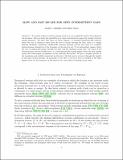Slow and fast escape for open intermittent maps
Abstract
If a system mixes too slowly, putting a hole in it can completely destroy the richness of the dynamics. Here we study this instability for a class of intermittent maps with a family of slowly mixing measures. We show that there are three regimes: (1) standard hyperbolic-like behavior where the rate of mixing is faster than the rate of escape through the hole, there is a unique limiting absolutely continuous conditionally invariant measure (accim) and there is a complete thermodynamic description of the dynamics on the survivor set; (2) an intermediate regime, where the rate of mixing and escape through the hole coincide, limiting accims exist, but much of the thermodynamic picture breaks down; (3) a subexponentially mixing regime where the slow mixing means that mass simply accumulates on the parabolic fixed point. We give a complete picture of the transitions and stability properties (in the size of the hole and as we move through the family) in this class of open systems. In particular, we are able to recover a form of stability in the third regime above via the dynamics on the survivor set, even when no limiting accim exists.
Citation
Demers , M F & Todd , M 2017 , ' Slow and fast escape for open intermittent maps ' , Communications in Mathematical Physics , vol. 351 , no. 2 , pp. 775-835 . https://doi.org/10.1007/s00220-017-2829-6
Publication
Communications in Mathematical Physics
Status
Peer reviewed
ISSN
0010-3616Type
Journal article
Description
MD was partially supported by NSF grant DMS 1362420. This project was started as part of an RiGs grant through ICMS, Scotland.Collections
Items in the St Andrews Research Repository are protected by copyright, with all rights reserved, unless otherwise indicated.

